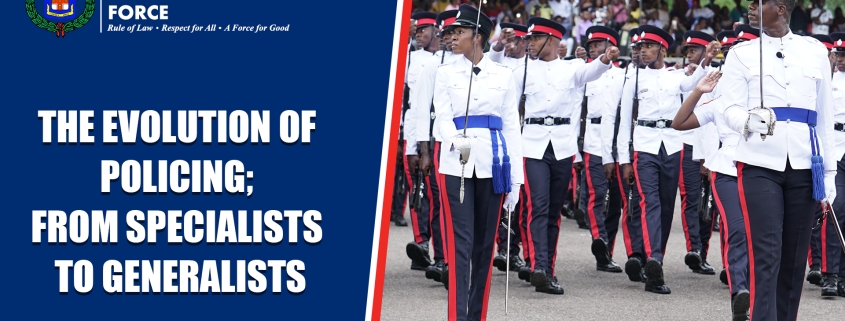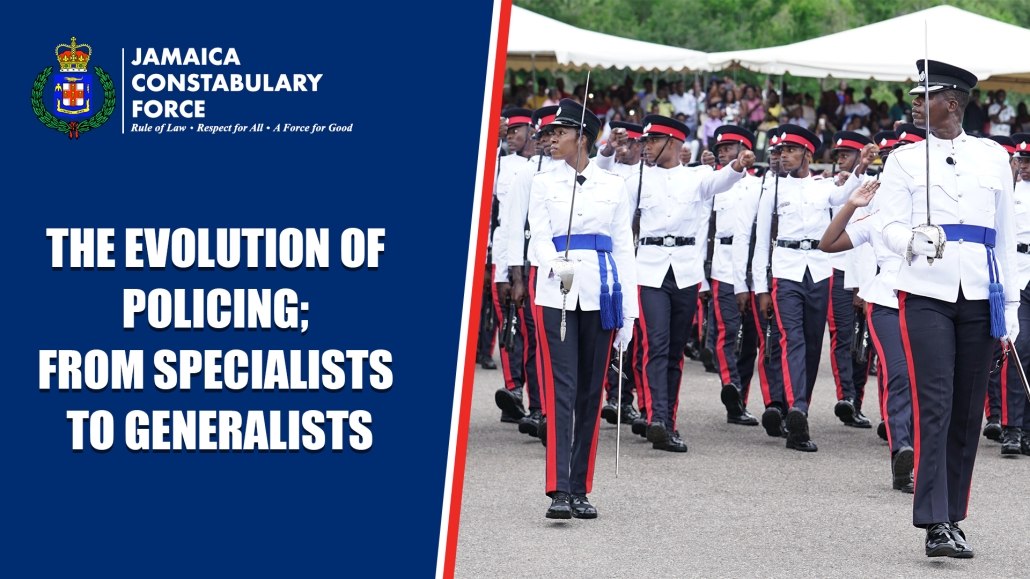The Evolution of Policing; From Specialists to Generalists
The Evolution of Policing; From Specialists to Generalists
In the annals of the Jamaica Constabulary Force (JCF), there was once a time when a ‘name brand police’ officer, celebrated for a singular skill or remarkable act, could rise to near mythic status. These were officers who, often with limited resources and support, became symbols of resilience and tenacity. Their mastery of a particular facet of policing – whether it was their fearless approach to crime-fighting, their precision in investigations, or their sharp instincts in intelligence gathering – captured the public’s imagination. These figures were often larger than life, and their contributions laid the foundation for the modern JCF.
However, policing in the 21st century demands more. The complexities of today’s world require not only the deep expertise that these officers represented but also the ability to see the bigger picture. While the contributions of these past heroes remain invaluable, modern policing must go beyond specialization. As Police Commissioner, Dr Kevin Blake notes in last week’s ‘Commissioner’s Corner’, the challenges we face today call for officers who are capable of both depth and breadth, who can integrate specialized knowledge into a broader, more dynamic framework.
Depth and Breadth as The New Paradigm
In today’s JCF, the value of a Specialist’s deep understanding of a particular function remains significant. Specialists in areas like traffic management, intelligence, or criminal investigations remain the backbone of effective operations. Their expertise is crucial for executing precise, mission-critical tasks. As Commissioner Blake insightfully noted, “As a Specialist, your scope of work is narrow but deep… as we prepare to be elevated to the next level, we must be mindful that our role will become broader and less deep.”
The transition from Specialist to Generalist is not about abandoning the old ways but building upon them. It is about evolving into leaders who can integrate the depth of their specialized knowledge into a wider strategic vision. The Commissioner reminds us, “It means we need to begin to shape our thought processes around the assessing of the output of the Specialists rather than being one.”
For example, consider a Station Commander who rose through the ranks as a traffic management expert. While their specialized knowledge of road safety is critical, their new role now requires them to oversee investigations, community relations, and intelligence gathering. Leaders must be able to synthesize these varied functions into a coherent whole. As Commissioner Blake noted, “A Sub-Officer in Charge of a station cannot deliver effective service if his focus is mainly around traffic management because that’s his area of expertise.”
Honouring the Past, Embracing the Future
The ‘name brand police’ officers of the past—heroes who built their reputations on singular achievements—were products of their time. They operated within a framework where specialization was paramount, and their ability to focus on one area often made them local legends. Their accomplishments, while remarkable, reflected a narrower scope in a simpler policing landscape.
Today, however, the complexity of modern policing requires us to adapt. While we honour the contributions of past officers, it’s important to acknowledge that the JCF has undergone extraordinary transformation. From our ISO9001 certification to advances in crime-fighting technology and leadership training, the Force is evolving. Modern leaders must embrace a Generalist mindset, where understanding a range of specializations is just as important as the mastery of any one discipline.
As Commissioner Blake wisely remarked, “The higher up the ladder you climb, the more function areas that you become responsible for, thereby giving you less time to practice the craft of each to maintain expertise.” The challenge is not to replicate the heroes of the past, but to build upon their legacies by integrating diverse skills into a unified leadership approach.
Building a Future of Thinkers and Leaders
The JCF’s future demands more than the perpetuation of the Specialist-Generalist dichotomy.
It requires officers who can embody the best of both worlds—leaders who respect the deep expertise of Specialists but who also have the strategic vision of Generalists. This balance is key to modernizing the JCF and preparing it for the complexities of the future.
Career development in today’s JCF should be about fostering adaptability and growth. Officers should be encouraged to step outside of their comfort zones, to explore new areas of the Force, and to build careers that are both broad and deep. The most effective leaders will be those who can blend their specialized knowledge with a comprehensive understanding of the diverse functions within the Force.
The heroes of the past laid the foundation, but the future belongs to those who can adapt and innovate. As Commissioner Blake notes, “What should concern you at this point is knowing when a shoe is properly made even while you cannot make one.” This statement highlights the need for leaders to appreciate specialized skills without needing to be experts in every area themselves.
A Dynamic and Capable Force
The evolution from Specialist to Generalist within the JCF is more than a shift in professional development—it represents a shift in the very culture of policing. By building on the legacy of our past heroes, while embracing modern strategies that demand a broader scope of leadership, we are creating a Force that is more dynamic, more capable, and ultimately, more effective in serving the people of Jamaica.
The future of policing is about balance—between depth and breadth, between specialization and generalization, between respecting the past and preparing for the future. By embracing both our history and the demands of modern law enforcement, the JCF is not just adapting—it is leading the way.










Leave a Reply
Want to join the discussion?Feel free to contribute!